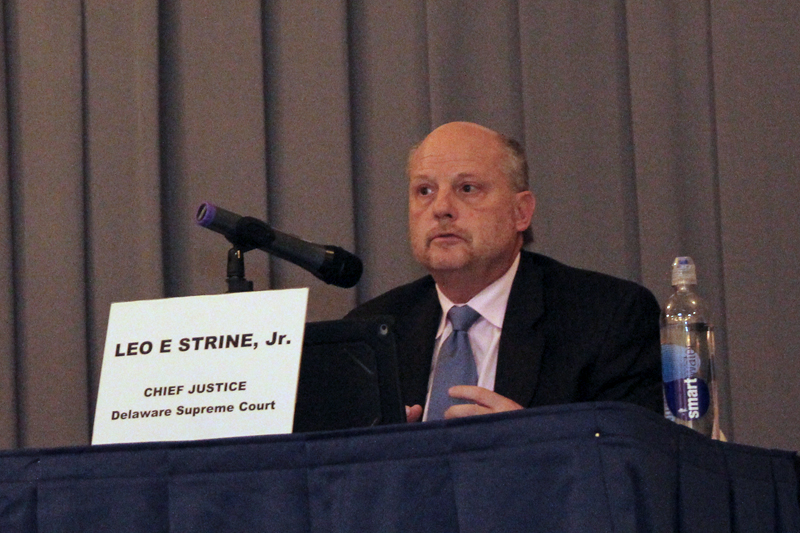Delaware's Supreme Court chief justice says many people who end up in court are there for economic reasons.
"They have an economic and education problem. Unless you give people a way to make a living in a dignified way and provide for themselves, then they are tempted," said Chief Justice Leo Strine Jr., during a forum March 7 in Lewes sponsored by the Southern Delaware Alliance for Racial Justice.
Most people who accept a plea are guilty, and there should be resources for them if needed, Strine said, but there are a lot of folks who do not have a substance abuse problem or mental health problem.
When people don't feel effective, he said, they might drink, make bad decisions and then end up in jail, where they often learn more criminal behavior from other inmates.
For them, high bail facilitates a life of crime.
Strine said while some criminals should be held with no bail – Charles Manson, Earl Bradley or El Chapo – offenders facing minor charges should get a break.
"If you're an ordinary schmuck or schmuckette and you got arrested for shoplifting or some small theft or maybe you're dealing a little bit of dope, but you're not a kingpin, and we don't really think you're a threat to the community, then why are we giving you $5,000 bail? If you had $5,000 bail, you probably wouldn't be doing those things anyway," he said.
When asked about the high number of African-Amercans in Delaware's prisons, Strine said poverty plays a role. Nearly 60 percent of black families in Delaware live at or below 200 percent of poverty, he said.
"To my mind, the most compelling justice issue in Delaware is the fact that black people in Delaware have too much access to criminal justice," he said. "The reality is most of the people we tend to find in prison are folks who lack educational and economic opportunity ... as long as there is a disproportionate number of black people in this country who are poor and have less economic opportunity, they are more likely to try to find a way to make a living in a way that is not in the legitimate economy."
Lewes resident Tom O'Hagan echoed a question asked of Attorney General Matt Denn, who attended a November forum, by asking Strine why previous arrests against a person are taken into consideration, even if no charges are filed.
"A pattern of contact with law enforcement in a way that [Denn's] office might think is legitimate ... and there was good faith to arrest a person, but they couldn't actually prove it, is something [the Attorney General's Office] could take into account," Strine said.
Where someone lives can also be a factor, even though there is known drug activity in wealthy neighborhoods, he said.
"I'm not sure there's a lot of drug raids in Henlopen Acres. My sense is some blow [cocaine] has been used there over the years," he said.
Already, Strine said, court officials and legal experts are working to improve legal services by encouraging more attorneys to participate pro bono and hiring more full-time conflict attorneys. Access to legal services is also an area for improvement.
"We are going to be the first state in the country to have all of its civil caseload on one electronic filing system by the end of the year. That access makes it easier for everyone involved," he said.
In today's internet society, Strine said public law libraries are under-utilized as more law firms have access to information online, and he suggested using the law facilities to help people understand their legal rights.
Court officials also hope to use more human resources across the state to help decrease a backlog of cases. Court employees often don't think about working outside of county lines, but a unified system is preferential, Strine said.
"A lot of people don't think of themselves as the judiciary of the state of Delaware. They often think of themselves as from a particular court of a particular county," he said. "One of the things we're trying to do is get more of a mindset where we all work together and pitch in."

























































